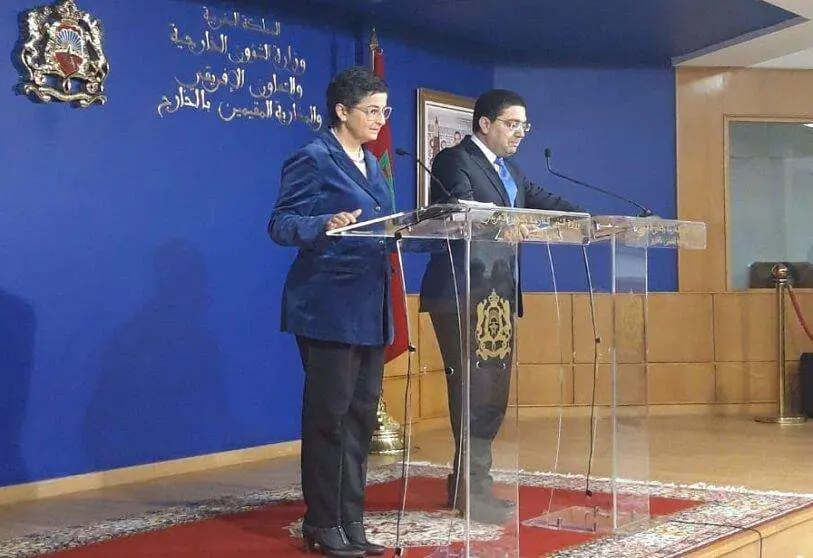Marruecos niega contactos con España y advierte sobre el peligro de ruptura

The Moroccan Minister of Foreign Affairs, Nasser Bourita, affirmed that "there has been no contact with Spain since the outbreak of this current crisis", caused by the secret entry onto Spanish soil of the Secretary General of the Polisario Front, Brahim Ghali, to be hospitalised for COVID-19 in a hospital in Logroño.
Bourita was interviewed by the French radio station Europe 1, and in his words he explicitly denied the Spanish Minister Arancha Gonzalez-Laya, who this morning said on Radio Nacional de España that Spain and Morocco are holding discreet talks.
"Contrary to what the minister says", Bourita declared, "there have been no contacts since the outbreak of the crisis (in mid-April), and contrary to what she says, we were never informed of the arrival of this individual" in Spain.
Bourita made the distinction between the European Union and most of its countries, with which there are "very good relations" and "a hostile attitude from Spain" that has created, he says, this bilateral crisis.

"Today there is a problem of trust and mutual respect with Spain", he added, and warned, more explicitly than in previous days: "It is now up to Spain to find a solution: if it opts for the exit (of Ghali) in the same way it entered, it is looking for a worsening of the crisis or even a rupture".
Bourita's words to the French radio station come after almost 24 hours of calm and a lack of declarations, after a week of constant messages warning Spain about Ghali's fate.
This Sunday it was learned that Morocco has accepted the return of 7,500 people of the almost 9,000 who entered the city illegally, between those who left voluntarily and those forced to return, according to figures offered by the Government Delegation in Ceuta, and without Morocco having offered the slightest information on the matter.
Throughout the day, only the Federation of the Democratic Left, a small group with only two deputies in parliament, distanced itself from the patriotic atmosphere prevailing in the political class and criticised its government in a communiqué on the migration crisis, where it "categorically rejects any kind of instrumentalisation of the tragedies of citizens (because) the dignity of citizens is a fundamental priority".

On Saturday, the president of the government, Saad Eddine El Othmani, referred to the crisis with Spain, but ignored the migratory avalanche; he focused instead on asking European countries for "clear discourse" on Western Sahara, as opposed to their supposed opacity, and recalled, in an obvious allusion to Spain, that Morocco had never agreed to support Catalan separatism.
Speaking on the migration crisis this day, Jean-Yves Le Drian, the foreign minister of France, a former colonial power and a country that has a solid alliance with Morocco that goes back several decades.
Le Drian avoided showing solidarity with Spain and referred to the migratory avalanche as a "totally regrettable" incident, before saying that he had spoken to Bourita on Sunday, "to try to contribute so that this dialogue (between Spain and Morocco) can be re-established".

One of the groups most affected by the migratory crisis are the so-called "transfronterizos", Moroccans who worked in Ceuta (there are some 3,500 of them) in domestic service, assistance or manual work and who have been without work since March 2020, when Morocco closed the land border with Ceuta.
The secretary general of the Collective of Cross-border Workers, Chakib Marouan, told Efe on Sunday that many members of his collective took advantage of last Monday's border control to present themselves in Ceuta and claim their jobs, but in almost all cases they were met with employers who advised them to turn back and look for a legal formula to return at another time.
Most of them have now returned to their homes in Castillejos and the region, and are asking the government for help to get by in the absence of a clear prospect of the border opening.
On another level, yesterday an incipient movement emerged on social networks calling for a boycott of Spanish products in Morocco, to protest against Spain's attitude in welcoming the secretary general of the Polisario Front, Brahim Ghali, who is ill with COVID, for medical reasons, which has been at the root of the current crisis; however, the campaign, started on Facebook and Twitter, does not have many followers and has not caught on among the population so far.








